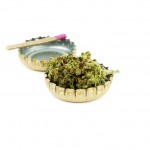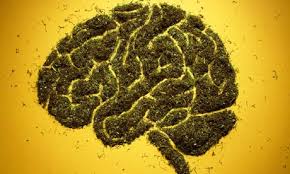
For over a decade, research has attempted to examine the relationship between cannabis use and psychosis, and we have summarised some of this cannabis and psychosis research in blogs on the Mental Elf.
There is still some controversy in the debate about the nature of the relationship; some have found no link between cannabis use and psychosis (e.g. Buchy et al 2014) and others have found that those at high risk of psychosis who used cannabis were more likely to transition to psychosis than those who did not (e.g. Kristensen & Cadenhead 2007).
In a recent study, Auther et al (2015) argued that previous research has failed to take into account the potential confounding effects of other substance use. In particular, the authors of the current study were interested in the potential role that alcohol may play in the relationship between cannabis use and psychosis, given the high prevalence rate of alcohol use in people with schizophrenia and in clinical ‘high risk’ samples.

There remains some controversy about the links between cannabis and psychosis.
Methods
In 2007, a database (North American Prodrome Longitudinal Study Phase 1) was formed to collate data from 8 independent research sites in the US, collected across a 7 year period. Data were included for several clinical, cognitive and functioning variables for a total of 888 participants. Of these, 370 (41.7%) were characterised as clinical high risk for psychosis based upon the Structured Interview for Prodromal Syndromes (SIPS). Twenty-nine participants were excluded from the study as they did not have data on cannabis use, and a further 58 were lost to follow-up. This left a total of 283 participants for the outcome analysis in the current study.
Limited demographic information was reported by the authors, with the exception of the mean age of the sample (18.3 years); however the reference was provided for a paper using the same sample (Cannon et al 2008). Participants (N=283) were divided into groups based on DSM-IV criteria for cannabis use. These included: no cannabis use (n=211; 61.9%), cannabis use without impairment (n=63; 18.5%), cannabis abuse (n=45; 13.2%) and cannabis dependence (n=22; 6.5%). The latter two categories were combined in the analysis due to smaller numbers.
The aims of the study were to identify:
- The rate of substance use in the North American Prodrome Longitudinal Study Phase 1 sample
- The relationship between cannabis use and positive and negative symptoms of psychosis
- The impact of level of cannabis use on conversion to psychosis
- The impact of other substances, particularly alcohol, on the association between cannabis and conversion to psychosis
Results
In this sample, 45.3% reported alcohol use and 31.8% reported cannabis use, whilst use of other drugs was rare. A high proportion (85%) of those using cannabis also reported alcohol use.
- 79 of the 283 young people converted to psychosis during the follow up period:
- 46 (26.4%) from the ‘no use’ group
- 9 (17.6%) from the ‘use without impairment’ group
- 24 (41.4%) from the ‘abuse or dependence’ group
- The conversion rate was significantly higher in the ‘abuse or dependence’ group in comparison to both the ‘no use’ (log-rank test –x2 = 4.67, p = .031) and ‘use without impairment’ (log-rank test –x2 = 4.92, p = .027) groups.
A regression analysis was used to examine the contribution of cannabis use to conversion to psychosis when controlling for other predictor variables (age, gender, SIPS positive symptom total, SIPS negative symptom total). Cannabis ‘abuse or dependence’ was significantly related to conversion to psychosis (p = .015), but overall cannabis use and ‘use without impairment’ were not (p = .104 and p = .703 respectively).
When alcohol use was added to the regression model using the same levels of categorisation, there was no significant association between alcohol use and conversion to psychosis at any level (overall use p = .531; use without impairment p = .340; abuse or dependence p = .902). However, when alcohol use was added to the model, the association between cannabis ‘abuse or dependence’ and psychosis was no longer significant (p= .064).

Cannabis ‘abuse or dependence’ was significantly related to conversion to psychosis, but overall cannabis use and ‘use without impairment’ were not.
Limitations
This study had a decent sample size and provides useful information on prevalence of substance use and conversion to psychosis, however there are several limitations:
- Substance use was recorded at baseline but not throughout the follow up period, so it is unknown what effect, if any, continued use would have had
- 17% of the sample was lost to follow-up and there is no explanation of what happened to these young people. Unfortunately, like with loss to follow-up in many studies, it may be that it was impossible to find out what happened to these young people. However, it may have been interesting to examine the baseline characteristics of those lost, particularly in relation to their level of cannabis use
- It is also unclear exactly how long the follow-up period was, and without doing a bit of digging to find out more about the sample it is difficult to establish how generalisable the results are

17% of young people in the study were lost to follow-up, which is a major limitation.
Conclusions
The results of the study suggest that within a sample of young people at high risk of psychosis, cannabis abuse or dependence significantly increased the risk of conversion to psychosis. Furthermore, whilst alcohol was not related to conversion to psychosis itself, it weakened the relationship between cannabis and psychosis.
Interestingly, the authors report that alcohol may confound the relationship between cannabis and psychosis, but there is limited interpretation of this result. This study emphasises the complexity of the relationship between cannabis use and psychosis and highlights the importance of controlling possible confounding factors that could lead to an overestimation of the relationship.

Whilst alcohol use was not related to conversion to psychosis itself, it weakened the relationship between cannabis use and conversion to psychosis.
Links
Primary paper
Auther AM, Cadenhead KS, Carrión RE, Addington J, Bearden CE, Cannon TD, McGlashan TH, Perkins DO, Seidman L, Tsuang M, Walker EF, Woods SW, Cornblatt BA. Alcohol confounds relationship between cannabis misuse and psychosis conversion in a high-risk sample. Acta Psychiatr Scand 2015 Jan 9. doi: 10.1111/acps.12382. [Epub ahead of print] [PubMed abstract].
Other references
Buchy L, Perkins D, Woods SW, Liu L, Addington J. (2014). Impact of substance use on conversion to psychosis in youth at clinical high risk of psychosis. Schizophr Res; 156:277–280. [PubMed abstract].
Kristensen K, Cadenhead KS (2007). Cannabis abuse and risk for psychosis in a prodromal sample. Psychiatry Res; 151:151–154.
Cannon TD, Cadenhead K, Cornblatt B et al. (2008). Prediction of psychosis in youth at high clinical risk: a multisite longitudinal study in North America. Arch Gen Psychiatry; 65:28–37.


Alcohol use confounds the relationship between cannabis use and conversion to psychosis: Kathryn Walsh present… http://t.co/99nF5A1GhU
Alcohol use confounds the relationship between cannabis use and conversion to… http://t.co/jwtvlEqsJ3 #MentalHealth http://t.co/EdHnS2Jnl6
@Mental_Elf -interesting in view of the under reporting on alcohol intake (BBC News)
Alcohol use confounds the relationship between cannabis use and conversion to psychosis https://t.co/7A1rxCgF5n via @sharethis
Alcohol confounds studies on #cannabis and psychosis #breakthetaboo http://t.co/xxVkggwJUM http://t.co/vlGQpc6KZC
#Pot Tweets: Alcohol use confounds the relationship between cannabis use and conversion to ps… http://t.co/xxczNSWJzQ #tameside #leeds
#Weed #News: Alcohol use confounds the relationship between cannabis use and conversion t… http://t.co/xxczNSWJzQ #rochdale #stockport
RT CLEARUK: Alcohol confounds studies on #cannabis and psychosis #breakthetaboo http://t.co/Uirsy6PkGa http://t.co/PcGhVhvLd4 http://www.weeds…
RT TruthActivist1: RT CLEARUK: Alcohol confounds studies on #cannabis and psychosis #breakthetaboo http://t.co/Uirsy6PkGa …
NEWS: Alcohol use confounds the relationship between cannabis use and conversion to psychosis (The Mental Elf… http://t.co/nRprtsaGAv
RT weedsglass: RT CLEARUK: Alcohol confounds studies on #cannabis and psychosis #breakthetaboo http://t.co/Uirsy6PkGa …
RT weedsglass: RT TruthActivist1: RT CLEARUK: Alcohol confounds studies on #cannabis and psychosis #breakthetaboo http://t.co/Uirsy6PkGa …
RT BluntLies: RT weedsglass: RT CLEARUK: Alcohol confounds studies on #cannabis and psychosis #breakthetaboo http://t.co/Uirsy6PkGa …
#Marijuana Tweets: Alcohol use confounds the relationship between cannabis use and convers… http://t.co/B9OyzH2SbD #middleton #heywood …
Alcohol use, cannabis use and conversion to psychosis http://t.co/m8crKQqu9y
@Mental_Elf @UCL_CPU remember when we looked at OASIS sample there was a drop in cannabis use when presented to services @lrv451
@Release_drugs Bad link. Working link: http://t.co/vNsFZbBn9g
Fascinating blog today by @kathryn_amy87 on the relationship between #alcohol, #cannabis & #psychosis http://t.co/ZFrq1yXzdm
Interesting – ‘Alcohol use confounds the relationship between cannabis use and conversion to psychosis’ https://t.co/RvAVlBNYi5
Don’t miss: Alcohol use confounds the relationship between cannabis use and conversion to psychosis http://t.co/ZFrq1yXzdm #EBP
[…] you’re more likely to be using other drugs as well). Previous studies suggest that tobacco and alcohol use may also confound the relationship between cannabis use and psychosis (Jauhar, 2014; Walsh, […]